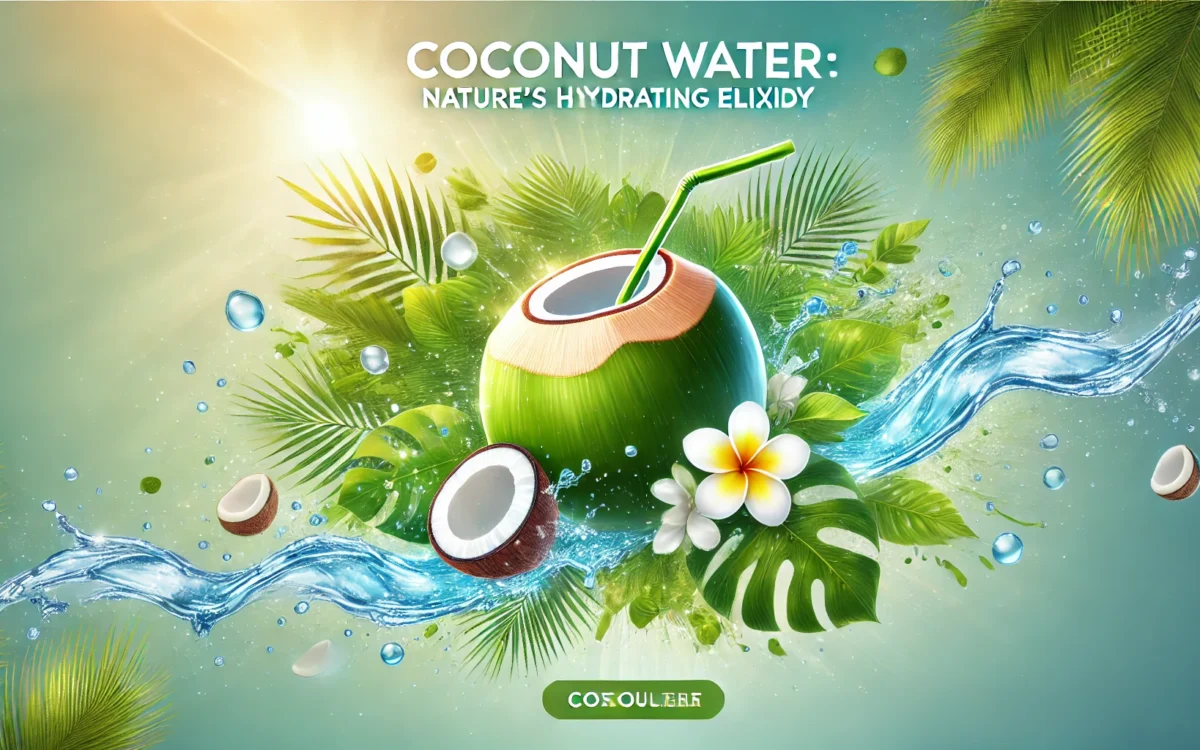Coconut Water: Nature’s Ultimate Hydration Beverage
Coconut water, often referred to as “nature’s sports drink,” has gained immense popularity over the years. Extracted from young, green coconuts, it is a clear, slightly sweet liquid that serves as a natural source of hydration and nutrition. Revered in tropical regions for centuries, coconut water has transcended geographical boundaries to become a global phenomenon, thanks to its numerous health benefits, refreshing taste, and versatility.
What is Coconut Water?
Coconut water is the clear liquid found inside young coconuts. Unlike coconut milk, which is derived from the grated flesh of mature coconuts, coconut water is fat-free and naturally low in calories. It serves as a vital nutrient reserve for the developing coconut, which is why it is packed with essential vitamins, minerals, and electrolytes. A single coconut typically contains 200 to 1,000 milliliters of water, depending on its size and age.
Nutritional Composition
One of the reasons for the global popularity of coconut water is its impressive nutritional profile. Here’s a breakdown of its key nutrients:
- Electrolytes: Coconut water is a rich source of electrolytes like potassium, sodium, magnesium, calcium, and phosphorus, making it an excellent choice for rehydration.
- Vitamins and Minerals: It contains essential vitamins such as Vitamin C, B-complex vitamins (like riboflavin and niacin), and small amounts of folate.
- Antioxidants: Coconut water contains cytokinins, which have antioxidant properties and may help combat free radicals.
- Low Calories: With approximately 45 calories per cup (240 ml), it’s a healthier alternative to sugary beverages.
- Natural Sugars: The sweetness of coconut water comes from natural sugars like glucose and fructose, which provide instant energy.
Health Benefits of Coconut Water
1. Superior Hydration
Coconut water is renowned for its ability to hydrate the body efficiently. Its electrolyte composition closely mirrors that of human plasma, making it an ideal choice for replenishing fluids lost during exercise, illness, or extreme heat. Athletes often prefer coconut water over artificial sports drinks because it is natural and free from synthetic additives.
2. Rich in Potassium
Potassium is crucial for maintaining heart health, muscle function, and electrolyte balance. A single serving of coconut water contains more potassium than a banana, making it an excellent dietary source of this essential mineral. Regular consumption may help regulate blood pressure and reduce the risk of cardiovascular diseases.
3. Supports Digestive Health
Coconut water contains natural enzymes like catalase, dehydrogenase, and peroxidase, which aid in digestion. Its mild laxative effect can also help alleviate constipation. Moreover, it’s an effective remedy for reducing acid reflux and heartburn.
4. Promotes Skin Health
The hydrating properties of coconut water extend to the skin. Drinking coconut water can improve skin elasticity, reduce blemishes, and give the skin a natural glow. Its antibacterial properties may also help in treating acne when applied topically.
5. Aids in Weight Management
Low in calories and fat-free, coconut water is a great addition to weight-loss diets. Its natural sugars provide energy without causing a spike in blood sugar levels, making it a suitable option for diabetics in moderation.
6. Improves Kidney Health
The high potassium content in coconut water may help prevent the formation of kidney stones by reducing calcium and oxalate levels in urine. Its natural diuretic effect can also aid in flushing out toxins.
7. Boosts Immunity
Coconut water contains lauric acid, a compound with antimicrobial and antiviral properties. Regular consumption may strengthen the immune system and help the body fight infections.
Coconut Water vs. Other Beverages
Coconut Water vs. Sports Drinks
Combating Glacier Melt: A Multifaceted Approach from Global Mitigation to Local Adaptation
While both are designed for hydration, coconut water is the more natural choice. It’s free from artificial colors, flavors, and added sugars commonly found in sports drinks. Moreover, the potassium levels in coconut water are significantly higher, making it a better option for replenishing electrolytes.
Coconut Water vs. Coconut Milk
Coconut water is a low-calorie, fat-free beverage, while coconut milk is rich in fats and calories, making them suitable for different dietary needs. Coconut water is ideal for hydration, whereas coconut milk is often used as a cooking ingredient or in smoothies for its creamy texture.
Coconut Water vs. Fruit Juices
Compared to fruit juices, coconut water is lower in calories and sugars. It also provides a broader spectrum of electrolytes, making it a healthier and more balanced choice.
Culinary Uses of Coconut Water
Beyond being a refreshing drink, coconut water is incredibly versatile in the kitchen. Here are some creative ways to use it:
- Smoothies: Blend coconut water with fruits like pineapple, mango, or berries for a tropical twist.
- Soups and Curries: Use it as a base for soups or curries to add a subtle sweetness and lightness.
- Rice and Grains: Cook rice, quinoa, or other grains in coconut water for added flavor and nutrients.
- Mocktails and Cocktails: Coconut water serves as an excellent mixer for non-alcoholic and alcoholic beverages alike.
- Desserts: Incorporate it into puddings, gelatins, or sorbets for a refreshing touch.
Sustainability and Ethical Considerations
The rising demand for coconut water has led to an increase in coconut farming. While this provides economic benefits to tropical regions, it’s essential to ensure sustainable practices. Overharvesting can deplete natural resources and harm the environment. Consumers should opt for brands that source coconuts ethically and support fair trade practices.
Potential Side Effects and Precautions
While coconut water is generally safe for most people, it’s important to consume it in moderation. Excessive intake may lead to:
- Electrolyte Imbalance: Overconsumption can result in an overload of potassium, causing hyperkalemia.
- High Sugar Intake: Though natural, the sugars in coconut water can add up if consumed in large quantities.
- Allergic Reactions: Rarely, individuals may experience allergic reactions to coconut water. Symptoms include itching, swelling, or difficulty breathing.
Pregnant and breastfeeding women, as well as individuals with kidney disorders or other medical conditions, should consult a healthcare professional before incorporating coconut water into their diets.
Selecting and Storing Coconut Water
For the best taste and nutritional value, always choose fresh, young coconuts when possible. If purchasing packaged coconut water, look for options with no added sugars, preservatives, or artificial flavors. Always check the expiration date and store unopened packages in a cool, dry place. Once opened, refrigerate and consume within a few days to maintain freshness.
Conclusion
Coconut water is more than just a trendy beverage; it’s a natural elixir with a plethora of health benefits. From hydration and digestion to skin health and weight management, its versatility makes it a valuable addition to any lifestyle. Whether you’re sipping it straight from a coconut on a tropical beach or pouring it into a smoothie in your kitchen, coconut water is a delightful way to nourish your body and soul.
As with any health trend, balance is key. Enjoy coconut water as part of a varied and balanced diet, and relish the goodness of this gift from nature.






